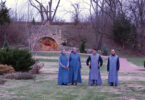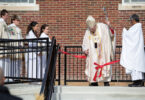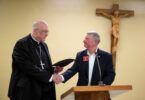by Melanie Lidman
HIA, Ghana (CNS) — Bishop John Yaw Afoakwah of Obuasi is furious.
In his celebratory white cassock, he picks his way carefully through shoulder-high mounds of dirt and deep puddles to approach the man with a gun sitting in front of the bulldozer. Two Chinese engineers catch sight of a reporter with a camera, accompanying the bishop, and dash into the bush.
In front of the bulldozer is a massive pit, surrounded by three other bulldozers and a mobile crusher. Shacks housing the Ghanaian workers are perched at the edge of the pit, with a few kids darting among them.
One might expect that Ghana’s illegal gold mining would be carried out hidden from public view, surreptitiously, quietly.
But behind the local Catholic clinic in Hia, a village of a few hundred farmers, is an enormous illegal gold mine out in the open. The bishop had planned to build a nursing hospital at this site. But now the area is filled with the detritus of gold mining: destroyed agricultural land and, even more dangerous, improperly disposed cyanide and mercury that cause myriad health problems.
The skyrocketing price of gold in recent years has led to a temporary invasion in Obuasi, undermining the social fabric and health of the people. An influx of foreigners, who have more cash to buy or rent earth-moving equipment, illegally remove the riches of the land, leaving a wasteland in their wake.
Meanwhile, a major mining company curbed its local operations, laying off thousands now desperate for work, no matter how dangerous. In the past year, the damage from these illegal mines has grown from irritating to catastrophic, with women religious dealing with the fallout and advocating for solutions.
Ghana is Africa’s second-biggest gold producer, after South Africa, yet only 16 percent of Ghana’s tax revenues come from gold mining, according to the Ghanaian government’s Minerals Commission, which oversees the industry.
A massive growth in the value of gold over the past 15 years has also made Ghana attractive for foreign nationals. The price of gold rose from U.S. $349 an ounce in April 2001 to a high of $1,911 in August 2011. So far this year, the price has hovered between $1,100 and $1,300 per ounce.
“When gold prices went up, people started using all kind of means for small-scale mining, things like backhoes and bulldozers,” explained Isaac Abraham, senior public relations officer at the Ghanaian Minerals Commission. “This type of small-scale mining (by foreigners with heavy machinery) is fairly recent, only since 2009.”
Illegal mining has wreaked havoc on the environment, especially the waterways, and brought a host of social and health problems to rural villages. Since commercial mining began in Obuasi in 1897, there have always been “illegal” miners, who worked without permits. Locally, these miners are called “galamsey”; they work independent of mining companies.
Bishop Afoakwah was in the middle of a homily in front of all of the village chiefs and more than 200 attendees to mark the International World Day of the Sick at the Hia clinic, when “galamsey” workers bringing in earth-moving equipment clipped the electrical line and cut power for the entire town. There was a moment of angry silence as the machine retreated behind the clinic. The local choir hurriedly got to its feet to sing while a generator was set up.
Afterward, the bishop met with the village chiefs to try to determine how an illegal gold mine could be operating so brazenly on church land. Bishop Afoakwah said one of the local chiefs donated the land to the church several years ago to build the clinic and, in the future, a nursing college. He said the church holds the legal deeds to the land and is still fundraising to build the college.
In the meeting, the chiefs presented a complicated story of interwoven land rights, with various chiefs “protecting” land for other chiefs and, somewhere along the line, someone accepted an illegal payoff from the miners.
When Bishop Afoakwah arrived at the site after meeting with the chiefs, the Chinese miners told him that they had received a concession from a “Mr. Kumar,” which the bishop said is impossible because the church holds the rights to the land. He has been unable to determine who Kumar is, or if he exists.
AngloGold Ashanti, a multinational gold mining conglomerate that has been operating in Obuasi since 1897, controls mining concessions for most of the area.
Hia lies just outside of the AngloGold Ashanti concession, muddying the waters as to actual ownership.
It is illegal for foreign nationals, including the two Chinese engineers at the Hia site, to be involved in any aspect of mining. But without a clue to who owns the mine, it’s also difficult to determine who owns the concession. This lack of information over land rights, common in rural areas, obstructs any attempts at oversight or enforcement.
Another contributing factor is unemployment. In November 2015, AngloGold Ashanti laid off more than 5,000 of its 7,000 workers, partly due to mechanizing its workforce. It was a devastating blow for Obuasi, whose entire economy depended on the mine, and for the support industries that sprang up around the high salaries.
The city of 180,000 slid into a recession, with people struggling to put food on their tables.
So when foreign investors come to the Obuasi area, they have a willing pool of people desperate for work who have prior knowledge of mining operations. The layoffs have led to a local increase in illegal mining, exacerbated further by the increase in gold prices.
Options for employment are so few that risks from illegal mining are overlooked. “These people are oblivious of their health and the ecological issues,” explained Charles Owusu Antwi, a Catholic freelance journalist who previously worked as a communications officer for AngloGold Ashanti.
He said that gold mining along the riverbanks clouds the water with chemical discharge harmful to the people who drink it or use it. “We are trying to bring this to the public notice, but if you do so, you do it at the peril of your life. If you are seen telling people to put a stop to the kind of things they’re doing, you’ll be seen as putting them out of jobs or taking the bread and butter from their table. They’ll be violent to you, and you won’t have it easy.”
Bishop Afoakwah said this creates difficulties for church officials, who must not be seen as the ones taking jobs from needy villagers.
Sister Mary Owusu Frimpong, director of health for the Diocese of Obuasi, sees firsthand the detrimental effects. “We see skin diseases and rashes from the [polluted] water,” she said. Local hospitals also see horrific injuries stemming from improper use of heavy machinery. Since there is no safety oversight, Sister Frimpong says workers have been buried alive during hasty digging.
Additionally, when the illegal miners believe that the area has been exhausted of gold, they leave without covering or filling in pits they have dug. Rain collects in these large pits, and children who play there can drown. The pools also become breeding grounds for malarial mosquitoes, she explained.
Twenty sisters work in Catholic health services in Obuasi, and many of them deal with mining-related health issues.
There’s also concern about long-term effects, including cancer and birth defects, from the mercury and cyanide chemicals used in small-scale mining to extract the gold from the stone. But because the mines are illegal, it’s hard to track effects over time.
The mines also bring a host of social issues. “Because the mines bring money into an area, kids drop out of school,” Sister Frimpong said. Some are employed directly, others hang around the mines and try to collect remnants that they can resell. Health workers have also seen a rise in teenage pregnancies and sexually transmitted diseases, stemming from sex work. An influx of money and temporary workers into isolated, rural villages is a clear recipe for young girls to fall into prostitution, she added.
In rural areas, there are few opportunities besides farming. Even if the miners say they’ll only need the land temporarily, the area is destroyed for generations.
Activists say religious leaders can play an important role by using the pulpit to sensitize people to the dangers of mining and related economic justice issues.
Yet the spiritual message about environmental responsibility can be a tough case in the face of such poverty.
“Ghanaians are very religious, Christian or Muslim, but they don’t see the degradation of the environment as anything that has got to do with God,” said Antwi, the journalist. “Whether you destroy water bodies, so long as it gives you money, if it can put bread and butter on your table, then fine.”






